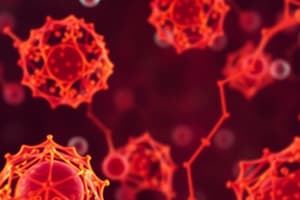Podcast
Questions and Answers
What is the main function of the G1 checkpoint in the cell cycle?
What is the main function of the G1 checkpoint in the cell cycle?
- To separate sister chromatids
- To ensure adequate cell growth and DNA replication (correct)
- To ensure complete DNA replication and preparation for mitosis
- To ensure proper spindle fiber attachment to chromosomes
What is the result of errors in chromosome segregation during mitosis or meiosis?
What is the result of errors in chromosome segregation during mitosis or meiosis?
- Increased cell growth
- Genetic abnormalities or aneuploidy (correct)
- Genetic diversity
- Cell differentiation
What is the main difference in cytokinesis between animal and plant cells?
What is the main difference in cytokinesis between animal and plant cells?
- Cytokinesis does not occur in plant cells
- The cell plate forms in plant cells, but not in animal cells (correct)
- Cleavage occurs in animal cells, but not in plant cells
- Furrowing occurs in plant cells, but not in animal cells
What is the main function of genetic recombination during meiosis I?
What is the main function of genetic recombination during meiosis I?
What is the result of cell differentiation?
What is the result of cell differentiation?
What is the function of cyclin-dependent kinases (CDKs) in the cell cycle?
What is the function of cyclin-dependent kinases (CDKs) in the cell cycle?
What is the function of the spindle checkpoint in the cell cycle?
What is the function of the spindle checkpoint in the cell cycle?
What is the result of errors in genetic recombination during meiosis I?
What is the result of errors in genetic recombination during meiosis I?
Flashcards are hidden until you start studying
Study Notes
Cell Division
Cell Cycle Regulation
- The cell cycle consists of three stages: interphase, mitosis, and cytokinesis
- Regulation occurs through checkpoints to ensure proper progression
- Checkpoints:
- G1 checkpoint: ensures adequate cell growth and DNA replication
- G2 checkpoint: ensures complete DNA replication and preparation for mitosis
- Spindle checkpoint: ensures proper spindle fiber attachment to chromosomes
- Cyclin-dependent kinases (CDKs) and cyclins regulate the cell cycle
- CDK inhibitors (CKIs) and retinoblastoma protein (Rb) also play a role in regulation
Chromosome Segregation
- Chromosome segregation occurs during mitosis and meiosis
- Chromosomes condense and attach to spindle fibers during prophase
- Sister chromatids separate and move to opposite poles during anaphase
- Chromosomes uncoil and form interphase nuclei during telophase
- Errors in chromosome segregation can lead to aneuploidy or genetic abnormalities
Cytokinesis
- Cytokinesis is the physical separation of the cytoplasm
- Occurs in two stages:
- Cleavage: the cytoplasm divides and the cell pinches in
- Furrowing: the cell splits into two daughter cells
- Cytokinesis occurs differently in animal and plant cells
- In animal cells, the cleavage furrow forms and the cell divides
- In plant cells, the cell plate forms and the cell divides
Genetic Recombination
- Genetic recombination is the exchange of genetic material between homologous chromosomes
- Occurs during meiosis I
- Increases genetic diversity by shuffling genes between chromosomes
- Recombination nodules form between homologous chromosomes and facilitate exchange
- Errors in recombination can lead to genetic abnormalities or infertility
Cell Differentiation
- Cell differentiation is the process by which cells become specialized for specific functions
- Involves changes in gene expression and cellular structure
- Differentiation occurs through a series of developmental stages:
- Determination: cells become committed to a specific fate
- Specification: cells acquire specific characteristics
- Morphogenesis: cells take on specific shapes and structures
- Cell signaling pathways, such as Notch and Wnt, regulate differentiation
- Errors in differentiation can lead to developmental disorders or cancer
Cell Division
Cell Cycle Regulation
- The cell cycle consists of three stages: interphase, mitosis, and cytokinesis
- Checkpoints ensure proper progression, including G1, G2, and spindle checkpoints
- Cyclin-dependent kinases (CDKs) and cyclins regulate the cell cycle, while CDK inhibitors (CKIs) and retinoblastoma protein (Rb) also play a role
Chromosome Segregation
- Chromosome segregation occurs during mitosis and meiosis
- Chromosomes condense and attach to spindle fibers during prophase
- Sister chromatids separate and move to opposite poles during anaphase
- Chromosomes uncoil and form interphase nuclei during telophase
- Errors in chromosome segregation can lead to aneuploidy or genetic abnormalities
Cytokinesis
- Cytokinesis is the physical separation of the cytoplasm
- Occurs in two stages: cleavage and furrowing
- Cytokinesis occurs differently in animal and plant cells
- In animal cells, the cleavage furrow forms and the cell divides
- In plant cells, the cell plate forms and the cell divides
Genetic Recombination
- Genetic recombination is the exchange of genetic material between homologous chromosomes
- Occurs during meiosis I
- Increases genetic diversity by shuffling genes between chromosomes
- Recombination nodules form between homologous chromosomes and facilitate exchange
- Errors in recombination can lead to genetic abnormalities or infertility
Cell Differentiation
- Cell differentiation is the process by which cells become specialized for specific functions
- Involves changes in gene expression and cellular structure
- Differentiation occurs through a series of developmental stages:
- Determination: cells become committed to a specific fate
- Specification: cells acquire specific characteristics
- Morphogenesis: cells take on specific shapes and structures
- Cell signaling pathways, such as Notch and Wnt, regulate differentiation
- Errors in differentiation can lead to developmental disorders or cancer
Studying That Suits You
Use AI to generate personalized quizzes and flashcards to suit your learning preferences.




